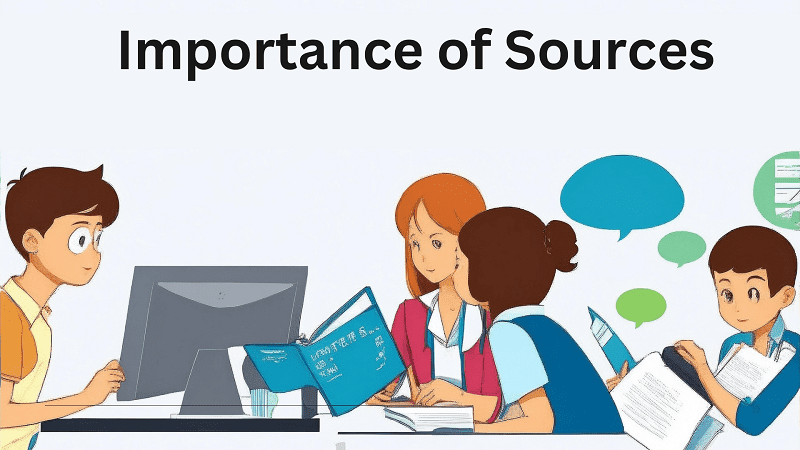
Information is readily available at our fingertips. However, not all information is reliable or credible, and as a student, it is essential to identify and use trustworthy sources. The sources of information we choose to use can have a significant impact on our academic success. In this article, we will explore the importance of sources of information as a student and discuss how to evaluate the reliability of the information.
- Introduction
As a student, you will be required to conduct research, write papers, and present information regularly. The sources of information you use to complete these tasks play a vital role in the accuracy, relevance, and credibility of your work. In this article, we will explore the importance of sources of information and provide strategies for finding reliable information. - The Role of Information in Student Life
Information is the backbone of learning, and it is essential for students to acquire and utilize information effectively. The information we use can influence our academic performance, help us develop critical thinking skills, and shape our perspectives. - Types of Sources of Information
Sources of information can be categorized into three types: primary, secondary, and tertiary sources.
Primary Sources
Primary sources are original materials that provide firsthand accounts or direct evidence of a subject. Examples of primary sources include original research studies, interviews, surveys, and historical documents.
Secondary Sources
Secondary sources provide an interpretation or analysis of primary sources. They are created after the fact and can include books, articles, and textbooks.
Tertiary Sources
Tertiary sources provide an overview or summary of primary and secondary sources. Examples of tertiary sources include encyclopedias, dictionaries, and textbooks.
- Evaluating the Reliability of Information
Evaluating the reliability of information is essential to ensure that the information used is accurate, relevant, and credible.
Authority
Authority refers to the expertise or qualifications of the author or publisher of the information. It is essential to determine if the author has the necessary expertise to write on the subject.
Currency
Currency refers to the timeliness of the information. It is essential to ensure that the information is up-to-date and relevant to the topic.
Objectivity
Objectivity refers to the impartiality of the information. It is essential to determine if the information is biased or presents a one-sided view.
Accuracy
Accuracy refers to the correctness of the information. It is essential to ensure that the information presented is factual and free of errors.
Relevance
Relevance refers to the significance of the information to the topic. It is essential to ensure that the information used is relevant to the subject being studied.

- Importance of Using Reliable Sources of Information
Using reliable sources of information can have a significant impact on academic success. Reliable sources of information can help students achieve better academic performance, develop critical thinking skills, avoid plagiarism, and build credibility.
Better Academic Performance
Using reliable sources of information can improve the quality of work and academic performance. Reliable sources of information provide accurate and relevant information, which is essential for writing high-quality papers, essays, and other academic works.
Developing Critical Thinking Skills
Using reliable sources of information can help students develop critical thinking skills. When evaluating sources of information, students need to analyze the information presented, determine the author’s perspective, and assess the evidence presented. This process helps students develop critical thinking skills and enhances their ability to analyze and interpret information.
Avoiding Plagiarism
Using reliable sources of information can help students avoid plagiarism. Plagiarism is the act of using someone else’s work without giving them proper credit. When using reliable sources of information, students can ensure that their work is original and properly cited.
Building Credibility
Using reliable sources of information can help students build credibility. When citing reliable sources, students demonstrate that they have conducted research, analyzed information, and developed informed opinions. This process builds credibility and enhances the student’s reputation as a knowledgeable and credible source of information.
- Strategies for Finding Reliable Sources of Information
Finding reliable sources of information can be a daunting task. However, the following strategies can help students find reliable information:
Utilizing Library Resources
Libraries offer a wealth of resources, including books, academic journals, and scholarly articles. These resources are often reliable sources of information and can be accessed through the library’s online catalog or in person.
Exploring Digital Libraries
Digital libraries offer a vast collection of resources that can be accessed from anywhere, at any time. Digital libraries offer access to academic journals, scholarly articles, and other reliable sources of information.
Consulting Scholarly Databases
Scholarly databases provide access to peer-reviewed articles, research studies, and academic journals. These sources of information are often reliable and credible and can be accessed through the library or online.
Networking with Peers and Experts
Networking with peers and experts can help students find reliable sources of information. Peers and experts can recommend books, articles, and other resources that are credible and reliable.
- Conclusion
In conclusion, the sources of information we choose to use can have a significant impact on our academic success. Using reliable sources of information can improve academic performance, develop critical thinking skills, avoid plagiarism, and build credibility. Students should evaluate sources of information using factors such as authority, currency, objectivity, accuracy, and relevance. Strategies for finding reliable sources of information include utilizing library resources, exploring digital libraries, consulting scholarly databases, and networking with peers and experts.